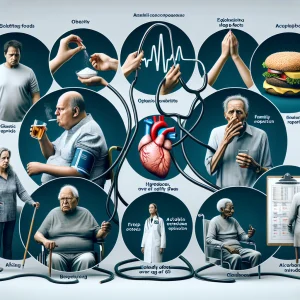Understanding High Blood Pressure: The Silent Killer's Impact on Health
High blood pressure, also known as hypertension, is a widespread health issue that impacts millions of adults worldwide. Many individuals may be completely unaware that they have high blood pressure since it often does not present noticeable symptoms. This lack of symptom awareness can be perilous, as untreated hypertension can lead to severe health complications, including heart disease, stroke, and kidney failure. For this reason, it is essential to undergo regular blood pressure screenings to monitor your health and ensure your blood pressure remains in a safe and healthy range.
Implementing small yet impactful lifestyle changes can significantly enhance your ability to manage blood pressure effectively. Simple modifications such as incorporating a nutritious diet filled with a variety of fruits, vegetables, whole grains, and lean proteins can make a noteworthy difference in maintaining healthy blood pressure levels. Additionally, prioritizing restorative sleep and regular physical activity can contribute to more effective blood pressure control, ultimately promoting better cardiovascular health and improving your overall well-being.
 Understanding Blood Pressure: Importance, Measurement, and Management
Understanding Blood Pressure: Importance, Measurement, and Management
Blood pressure refers to the force that blood exerts against the walls of your blood vessels, which is largely determined by the heart's pumping action. This critical measurement reveals how efficiently blood is circulated throughout your body and the degree of resistance it encounters as it flows through the arteries. It is vital to maintain normal blood pressure levels for overall health, as elevated readings can lead to serious medical concerns over time.
Blood pressure is measured in millimeters of mercury (mmHg) and consists of two integral numbers:
- Systolic Pressure – This is the first and higher number, indicating the pressure in your arteries when your heart contracts and pumps blood out.
- Diastolic Pressure – This is the second and lower number, reflecting the pressure in your arteries when your heart is at rest between beats.
For example, a reading of 120/80 mmHg indicates a systolic pressure of 120 and a diastolic pressure of 80, which is generally considered a normal and healthy range.
Recognizing the Causes and Risks of High Blood Pressure
High blood pressure can stem from various underlying factors, often linked to the narrowing of arteries that increase resistance to blood flow. This increased resistance can lead to elevated blood pressure levels, placing undue stress on essential organs, including the heart, kidneys, brain, and eyes. Over time, if hypertension remains uncontrolled, it can result in serious health complications, particularly cardiovascular diseases, which are among the leading causes of morbidity and mortality globally.
While blood pressure can vary for numerous reasons, healthcare providers classify readings based on established criteria:
Low blood pressure – 90/60 mmHg or lower
Normal blood pressure – Ranges from 90/60 mmHg to 120/80 mmHg
High blood pressure – 140/90 mmHg or higher
Readings between 120/80 mmHg and 140/90 mmHg indicate a potential risk of developing hypertension in the future. However, it’s crucial to remember that individual blood pressure norms can differ, making it essential to consult with your healthcare provider to determine your specific limits and health status.
 Exploring the Common Causes and Risk Factors of High Blood Pressure
Exploring the Common Causes and Risk Factors of High Blood Pressure
There is no singular cause of high blood pressure; rather, it is influenced by a variety of risk factors. Some of the primary contributors include:
- Being overweight or obese, which can put excess strain on the heart
- Smoking, as it damages blood vessels and raises blood pressure
- High-salt diets, which can contribute to fluid retention and increased blood pressure
- Family history of hypertension, indicating a genetic predisposition
- Excessive alcohol consumption, which can lead to hypertension
- Lack of sleep, which affects overall health and may raise blood pressure
- Inadequate physical activity, contributing to weight gain and increased blood pressure
- Aging, particularly individuals over 65, as blood vessels become less elastic
- Ethnicity, with individuals of Caribbean or African descent being at higher risk
Many of these risk factors can be modified through intentional lifestyle changes. In rare cases, high blood pressure may be attributed to underlying medical conditions or specific medications, affecting approximately 1 in 20 individuals. These conditions may include:
- Thyroid disorders, which can influence metabolism and blood pressure
- Kidney diseases, leading to fluid and electrolyte imbalance
- Diabetes, which can damage blood vessels
- Use of steroids, which can increase blood pressure
- Hormonal contraceptives, potentially leading to elevated blood pressure
- Recreational drugs, such as cocaine, which can spike blood pressure levels
Uncovering the Silent Symptoms of High Blood Pressure
One of the most significant challenges with hypertension is its tendency to remain asymptomatic, meaning that many individuals may be completely unaware that they have it. In the UK, it is estimated that around 25% of adults are living with undiagnosed high blood pressure, underscoring the importance of proactive health measures. The only reliable method to ascertain your blood pressure status is through comprehensive testing.
You can have your blood pressure assessed at various locations, including:
- Your GP's office or with a healthcare professional—simply request a blood pressure check.
- Many local pharmacies that offer blood pressure monitoring services.
- Some workplaces that provide health screenings as part of employee wellness programs.
- At home, using a personal blood pressure monitor for regular tracking.
 Implementing Effective Strategies for Lowering Your Blood Pressure
Implementing Effective Strategies for Lowering Your Blood Pressure
Since lifestyle factors play a significant role in the development and management of high blood pressure, making informed changes can greatly reduce your risk. Here are four essential strategies you can adopt to promote healthier blood pressure levels:
Integrate Regular Physical Activity into Your Routine
Engaging in regular exercise is vital for maintaining the health of your heart and blood vessels, ultimately contributing to lower blood pressure levels. Carrying excess weight can impose additional strain on your heart, making it work harder to circulate blood. By incorporating physical activity into your daily routine, you can achieve weight loss and enhance your cardiovascular fitness—both crucial components for lowering blood pressure and improving your overall health.
Embrace a Heart-Healthy Diet
Focusing on a balanced diet that prioritizes whole foods, including an abundance of fruits, vegetables, and lean proteins, can substantially contribute to lower blood pressure. Since high sodium intake is known to elevate blood pressure, it is essential to reduce salt consumption. The NHS recommends limiting salt intake to less than 6g per day, roughly equivalent to one teaspoon. Consider minimizing your consumption of processed foods, which are often high in salt, and instead use herbs and spices to flavor your meals, promoting a more heart-healthy lifestyle.
Control Alcohol Intake for Better Health
Limiting both the quantity and frequency of alcohol consumption can significantly influence your ability to manage blood pressure levels. Implementing alcohol-free days into your week and strategically spacing out drinking days can lead to positive outcomes. Although the NHS suggests a maximum of 14 units of alcohol per week—approximately equivalent to 7 pints of 4% ABV beer or 7 glasses of 175ml wine—it’s important to recognize that consistently reaching this limit is not necessary for everyone.
Prioritize Quality Sleep for Optimal Health
Consistently poor sleep patterns can increase the likelihood of developing high blood pressure. The NHS recommends aiming for 6 to 9 hours of quality sleep each night to support overall health and maintain appropriate blood pressure levels. Establishing a calming bedtime routine and creating an environment conducive to sleep can significantly improve the quality of your rest, thereby contributing positively to your cardiovascular health.
Presented By: Private Blood Pressure Tests
The Article Blood Pressure Test Explained: What You Need to Know Was Found On https://limitsofstrategy.com


Comments are closed